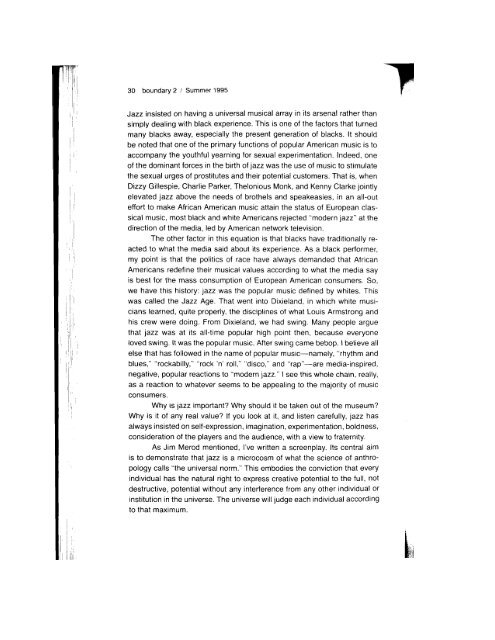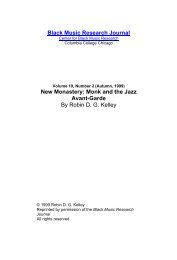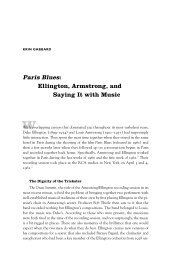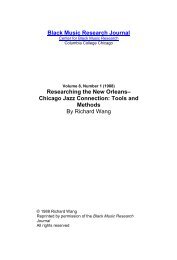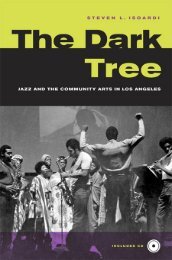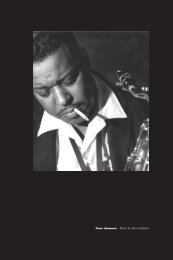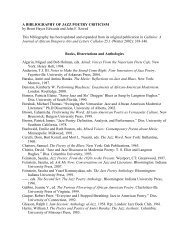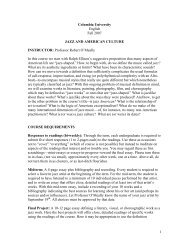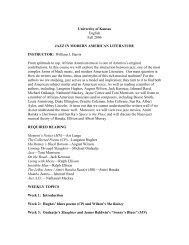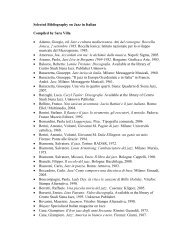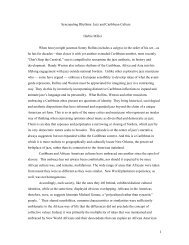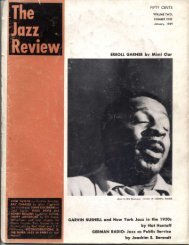Reflections on Jazz and the Politics of Race Tom Mcintosh
Reflections on Jazz and the Politics of Race Tom Mcintosh
Reflections on Jazz and the Politics of Race Tom Mcintosh
You also want an ePaper? Increase the reach of your titles
YUMPU automatically turns print PDFs into web optimized ePapers that Google loves.
30 boundary 2 / Summer 1995<strong>Jazz</strong> insisted <strong>on</strong> having a universal musical array in its arsenal ra<strong>the</strong>r thansimply dealing with black experience. This is <strong>on</strong>e <strong>of</strong> <strong>the</strong> factors that turnedmany blacks away, especially <strong>the</strong> present generati<strong>on</strong> <strong>of</strong> blacks. It shouldbe noted that <strong>on</strong>e <strong>of</strong> <strong>the</strong> primary functi<strong>on</strong>s <strong>of</strong> popular American music is toaccompany <strong>the</strong> youthful yearning for sexual experimentati<strong>on</strong>. Indeed, <strong>on</strong>e<strong>of</strong> <strong>the</strong> dominant forces in <strong>the</strong> birth <strong>of</strong> jazz was <strong>the</strong> use <strong>of</strong> music to stimulate<strong>the</strong> sexual urges <strong>of</strong> prostitutes <strong>and</strong> <strong>the</strong>ir potential customers. That is, whenDizzy Gillespie, Charlie Parker, Thel<strong>on</strong>ious M<strong>on</strong>k, <strong>and</strong> Kenny Clarke jointlyelevated jazz above <strong>the</strong> needs <strong>of</strong> bro<strong>the</strong>ls <strong>and</strong> speakeasies, in an all-outeffort to make African American music attain <strong>the</strong> status <strong>of</strong> European classicalmusic, most black <strong>and</strong> white Americans rejected "modern jazz" at <strong>the</strong>directi<strong>on</strong> <strong>of</strong> <strong>the</strong> media, led by American network televisi<strong>on</strong>.The o<strong>the</strong>r factor in this equati<strong>on</strong> is that blacks have traditi<strong>on</strong>ally reactedto what <strong>the</strong> media said about its experience. As a black performer,my point is that <strong>the</strong> politics <strong>of</strong> race have always dem<strong>and</strong>ed that AfricanAmericans redefine <strong>the</strong>ir musical values according to what <strong>the</strong> media sayis best for <strong>the</strong> mass c<strong>on</strong>sumpti<strong>on</strong> <strong>of</strong> European American c<strong>on</strong>sumers. So,we have this history: jazz was <strong>the</strong> popular music defined by whites. Thiswas called <strong>the</strong> <strong>Jazz</strong> Age. That went into Dixiel<strong>and</strong>, in which white musicianslearned, quite properly, <strong>the</strong> disciplines <strong>of</strong> what Louis Armstr<strong>on</strong>g <strong>and</strong>his crew were doing. From Dixiel<strong>and</strong>, we had swing. Many people arguethat jazz was at its all-time popular high point <strong>the</strong>n, because every<strong>on</strong>eloved swing. It was <strong>the</strong> popular music. After swing came bebop. I believe allelse that has followed in <strong>the</strong> name <strong>of</strong> popular music—namely, "rhythm <strong>and</strong>blues," "rockabilly," "rock 'n' roll," "disco," <strong>and</strong> "rap"—are media-inspired,negative, popular reacti<strong>on</strong>s to "modern jazz." I see this whole chain, really,as a reacti<strong>on</strong> to whatever seems to be appealing to <strong>the</strong> majority <strong>of</strong> musicc<strong>on</strong>sumers.Why is jazz important? Why should it be taken out <strong>of</strong> <strong>the</strong> museum?Why is it <strong>of</strong> any real value? If you look at it, <strong>and</strong> listen carefully, jazz hasalways insisted <strong>on</strong> self-expressi<strong>on</strong>, imaginati<strong>on</strong>, experimentati<strong>on</strong>, boldness,c<strong>on</strong>siderati<strong>on</strong> <strong>of</strong> <strong>the</strong> players <strong>and</strong> <strong>the</strong> audience, with a view to fraternity.As Jim Merod menti<strong>on</strong>ed, I've written a screenplay. Its central aimis to dem<strong>on</strong>strate that jazz is a microcosm <strong>of</strong> what <strong>the</strong> science <strong>of</strong> anthropologycalls "<strong>the</strong> universal norm." This embodies <strong>the</strong> c<strong>on</strong>victi<strong>on</strong> that everyindividual has <strong>the</strong> natural right to express creative potential to <strong>the</strong> full, notdestructive, potential without any interference from any o<strong>the</strong>r individual orinstituti<strong>on</strong> in <strong>the</strong> universe. The universe will judge each individual accordingto that maximum.


